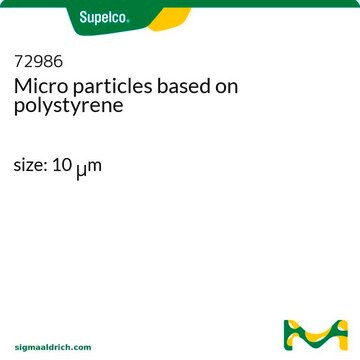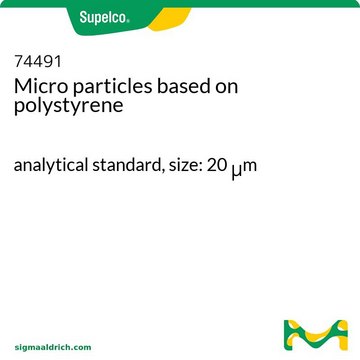79166
Micro particles based on polystyrene
size: 3 μm
Synonym(s):
Latex beads from PS
Sign Into View Organizational & Contract Pricing
All Photos(1)
About This Item
Recommended Products
Quality Level
form
aqueous suspension
crosslinking
0 % cross-linked
concentration
10% (solids)
particle size
3 μm std dev <0.1 μm, coeff var <3%
density
1.05 g/cm3
storage temp.
2-8°C
Looking for similar products? Visit Product Comparison Guide
General description
Micro Particles or Latex Beads, commonly known as polystyrene microparticles, are negatively charged colloidal particles. The microparticles are produced through a polymerization reaction of styrene under controlled conditions. The conducive environment of the reaction induces spontaneous coalescent bead formation. Micro Particles or Latex beads are supplied in aqueous solutions composed of polymer particles with water. Polystyrene′s refractive index at 589 nm is 1.5905 and 1.602 at 486 nm.
Application
Micro Particles or Latex Beads is used for a wide variety of applications like:Electron Microscopy.Cell Counter Calibration.Immunodiagnostics, especially for latex agglutination tests, andPhagocytosis Research.
Analysis Note
For every lot exact values of particle size and standard deviation are determined with an accuracy of 0.01 μm using a Coulter Multisizer.
Storage Class
10 - Combustible liquids
wgk_germany
WGK 3
flash_point_f
Not applicable
flash_point_c
Not applicable
ppe
Eyeshields, Gloves
Choose from one of the most recent versions:
Already Own This Product?
Find documentation for the products that you have recently purchased in the Document Library.
Customers Also Viewed
Yawei Liu et al.
ACS nano, 14(2), 1508-1519 (2020-02-14)
Micron-sized lasers fabricated from upconverting nanoparticles (UCNP) coupled to whispering gallery mode (WGM) microresonators can exhibit continuous-wave anti-Stokes lasing useful for tracking cells, environmental sensing, and coherent stimulation of biological activity. The integration of these microlasers into organisms and microelectronics
Our team of scientists has experience in all areas of research including Life Science, Material Science, Chemical Synthesis, Chromatography, Analytical and many others.
Contact Technical Service









